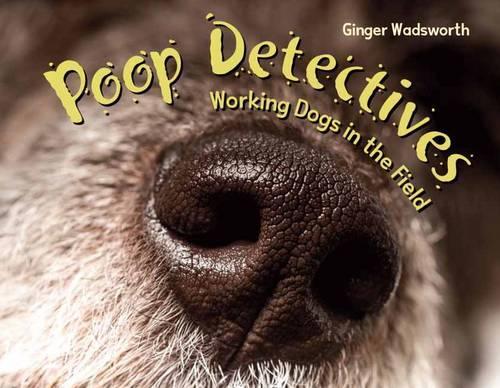
Poop Detectives: Working Dogs in the Field
(Hardback)
Publishing Details
Poop Detectives: Working Dogs in the Field
By (Author) Ginger Wadsworth
Charlesbridge Publishing,U.S.
Charlesbridge Publishing,U.S.
15th October 2016
United States
Classifications
Children
Fiction
636.70886
Physical Properties
Hardback
80
Width 287mm, Height 224mm, Spine 14mm
692g
Description
How can dogs that sniff for excrement, urine, vomit, and mucus help protect animals from extinction In the race to save endangered animals, finding solutions now is critical.Scat-detection dogs like Wicket, Tucker, and Orbee are conservation heroes and pioneers in a cutting-edge field of science. Canine detectives use their super sense of smell to locate the scat of target animals. From loose bear dung to gooey whale poop, scat can tell scientists valuable information about an animal's sex, age, diet, and health-all without harming the animal or endangering the researcher.
Reviews
"Super sniffer" dogs scent scat on land and at sea for scientific research. This examination of scat-detection dogs, who sniff out the feces of different creatures scientists study, begins with a fictional story based in reality. "Freddie" is saved from certain death in a shelter because he exemplifies two qualities essential in scat-detection dogs: high energy and the ability to focus. Beginning with the science behind what makes dogs such great sniffers, the book offers detailed text with lots of color photographs on glossy paper and sidebar photos with additional information. Background on how dogs began working in scat detection is followed up with information on training. Everything about these dogs is impressive. The stories of individual dogs (who often specialize in certain kinds of scat) are chronicled next, encouraging readers to connect to them as individuals. These dogs' stories take readers from mountain to ocean, desert, forest, and everglade. Readers are sure to come away with a deep fascination with and appreciation for scat-detection dogs' essential contributions to conservation work. Why Wadsworth makes assumptions about the knowledge and feelings of students outside the U.S. who meet scat dogs and their handlers (perhaps a chance for a teachable moment) is questionable and perplexing, however. Cultural misstep aside, this is a great choice for dog and science lovers alike. (introduction, author's note, glossary, resources, sources, bibliography, index)
- Kirkus Reviews
Poop can be a legitimate topic of scientific inquiry, and with their canine helpers, scientists are using animals' feces to gather data and make conservation decisions for endangered species. The book begins with a fascinating look at the special training and important jobs that canines take on in order to help scientists in the field. Using information gleaned directly from dog-handlers, veterinarians, biological scientists, and researchers, Wadsworth discusses the amazing adaptive abilities of dogs' olfactory functions and what qualities make dogs the perfect fit for the job of sniffing scat. Full-color photographs show dogs working in the desert, in the forest, and even on the open water, and reveal the synergy between humans and dogs. The narrative also emphasizes the lengths that scientists will go to protect endangered animals by studying their behavior patterns, their diets, and threats to their health. This book encourages readers to think about unconventional sources of information and the unusual methods of data collection necessary to scientific discovery.
- Booklist
Scat can tell scientists a lot about an animal's age, gender, diet, and health without harming the animal or the researcher. Scat-detection dogs are conservation heroes that use their amazing sense of smell to locate the feces, urine, horn, and hair of a targeted animal. This elite group of canines travel the world to help find and save endangered animals one poop at a time. The origin of these super sniffers (with Samuel Wasser recognized as the pioneer of the scat-detection field), how the rescued dogs are selected and trained, and specific examples of the different duties these dogs are assigned are covered. One example is a story about Tucker, a happy-go-lucky Labrador retriever mix who doesn't like to swim but is an expert at finding orca poop. A fine selection that will appeal to a wide range of readers, from dog and science lovers to conservation enthusiasts and kids who enjoy all things poop related.
- School Library Journal
Readers will likely be familiar with dogs that work with law enforcement and ranchers or those that provide assistance to people with disabilities. They may be surprised to learn that there are dogs that perform a critical task for wildlife ecologists and biologists: animal scat detection. The fecal matter of many animals provides clues to their health, and studying poop allows researchers to avoid trapping or killing animals to obtain this data. Wadsworth explains the training procedures for "detection canines," and then follows the dogs into the field. Numerous examples are provided to show how dogs' keen sense of smell utilized to find the scat of all sorts of animals, including bears, gorillas, sea turtles, and even whales (whale poop floats for a time), in addition to locating invasive species in the wild. Wadsworth conveys her fascination with the topic and her love of canines through excellent photographs of the enthusiastic dogs at work in the field with their handlers, as well as the creatures they sniff out. Copious asides and text boxes, and resources for further investigation, cover the topic thoroughly.
The Horn Book Magazine
Author Bio
Ginger Wadsworth is the author of more than twenty books, including Words West- Voices of Young Pioneers and First Girl Scout- The Life of Juliette Gordon Low (Clarion). She lives in Orinda, California.
